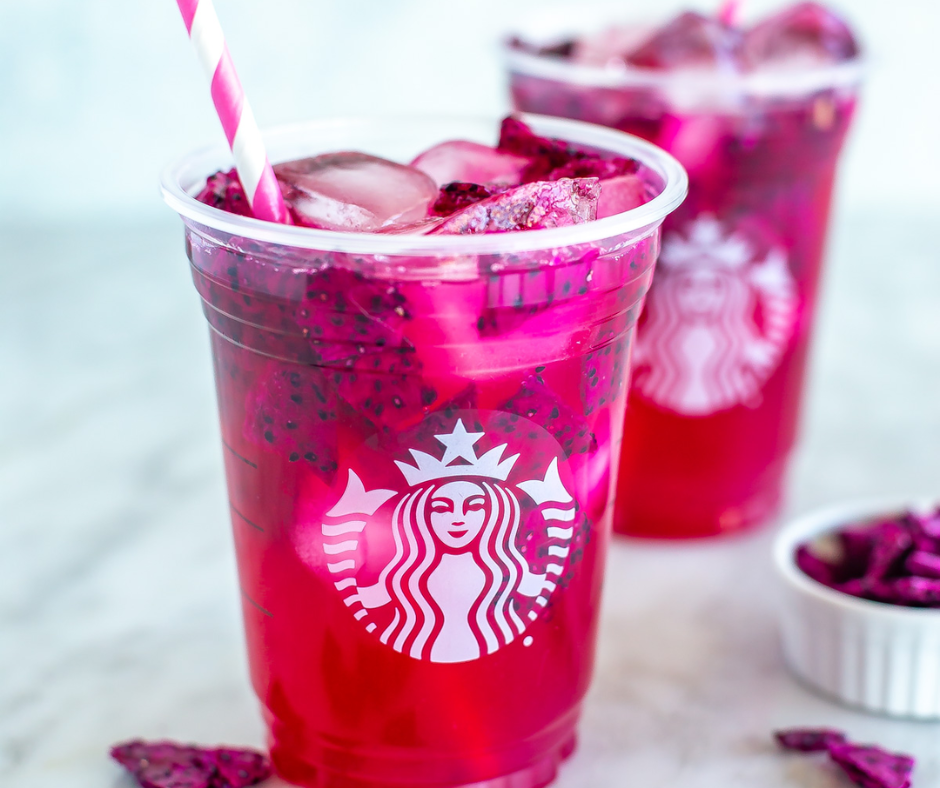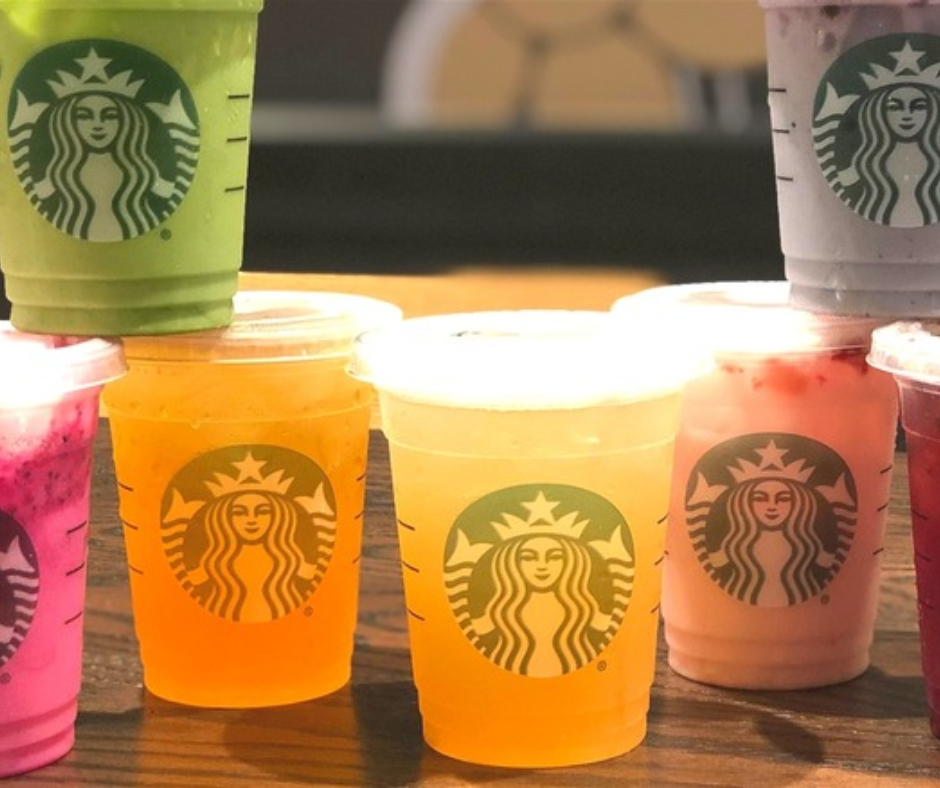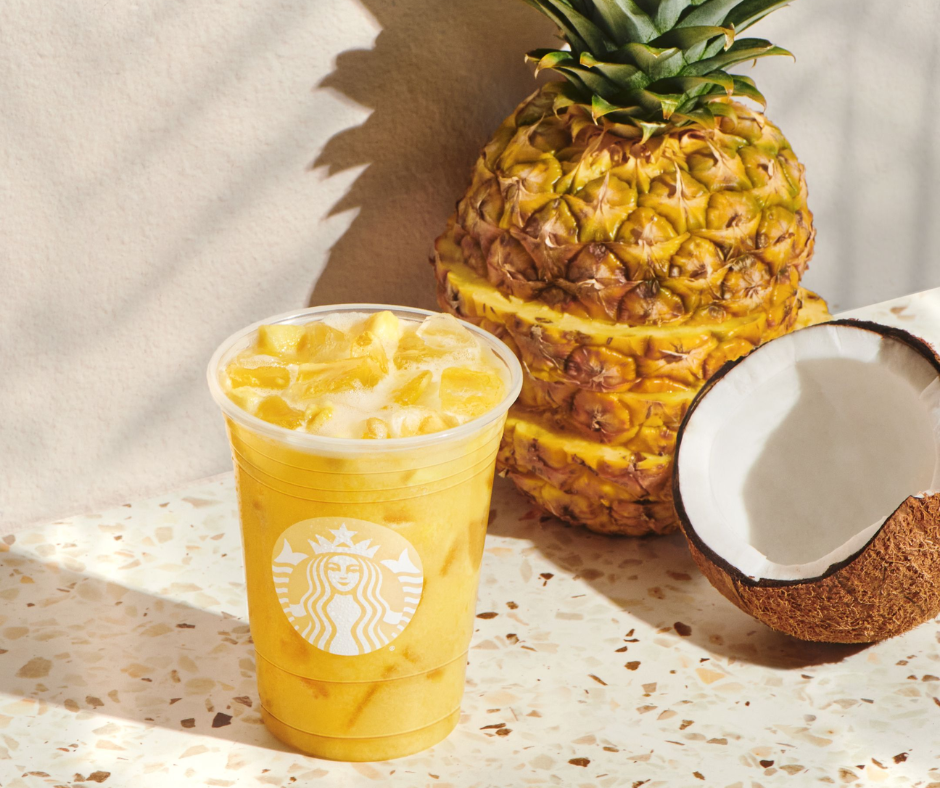Introduction
Curiosity about the caffeine content in Starbucks Refreshers is common among consumers, especially those conscious of their caffeine intake. With the popularity of these refreshing beverages, it’s important to know exactly ‘Do Starbucks Refreshers Have Caffeine?‘ to make informed choices. Caffeine is a stimulant that can affect the body, increasing alertness and reducing fatigue. Understanding the caffeine content in different beverages allows consumers to monitor their intake and make choices that align with their preferences and needs.
Why People Are Curious About The Caffeine Content In Starbucks Refreshers?
There are several reasons why people are curious about the caffeine content in Starbucks Refreshers:
- Health-consciousness: Many individuals are mindful of their caffeine consumption and prefer to limit their intake for various reasons, such as managing sleep patterns or minimizing dependence on stimulants.
- Sensitivity to caffeine: Some individuals are more sensitive to the effects of caffeine and may experience side effects, such as jitters or racing heart, with higher doses. Knowing the caffeine content allows them to make choices that align with their tolerance.
- Dietary preferences: People with dietary restrictions or preferences, such as avoiding coffee or tea, may turn to alternatives like Refreshers. Understanding the caffeine content helps them align their choices with their preferences.
The Importance Of Knowing The Caffeine Content In Beverages
Knowing the caffeine content in beverages is crucial for several reasons:
- Managing caffeine intake: Monitoring caffeine intake allows individuals to moderate their consumption and avoid exceeding recommended limits. This is especially vital for those sensitive to caffeine or who have health conditions that may be affected by its intake.
- Sleep quality: Caffeine can interfere with sleep, and knowing the caffeine content in beverages helps individuals avoid consuming them too close to bedtime, ensuring a better night’s sleep.
- Customizing beverage choice: Understanding the caffeine content allows individuals to select beverages that align with their desired level of alertness or relaxation. Whether seeking an energy boost or a caffeine-free option, knowledge of caffeine content guides their selection.
In conclusion, people are curious about the caffeine content in Starbucks Refreshers to make informed choices that align with their health, dietary preferences, and level of caffeine sensitivity. Awareness of the caffeine content in beverages is essential for managing intake, prioritizing sleep quality, and customizing beverage choices.
Understanding Starbucks Refreshers
What Are Starbucks Refreshers And How Are They Made?
Starbucks Refreshers are a line of iced beverages introduced by Starbucks in 2012. They blend real fruit juices, ice, and natural flavors, offering customers a refreshing and fruity option. The main ingredient in Starbucks Refreshers is a green coffee extract, which provides a gentle boost of energy without the strong coffee flavor. These beverages are caffeine-infused and perfect for those who want a pick-me-up without the intensity of a regular cup of coffee. Green coffee extract is derived from unroasted coffee beans and contributes to the light and fruity taste of Refreshers.
Variety Of Flavors And Options Available
Starbucks Refreshers come in a variety of flavors to cater to different preferences. Some popular flavors include strawberry acai, mango dragonfruit, and pineapple passionfruit. Customers can choose to have their Refreshers with or without lemonade or coconut milk, allowing for customization and personalization. With the option to add or reduce ice, customers can also control the concentration and intensity of their drink.
Starbucks also offers a selection of caffeine-free Refresher alternatives for those who are caffeine-sensitive or trying to avoid caffeine. These include the Cool Lime Refresher and the Raspberry Pomegranate Refresher, made with real fruit juice, ice, and a special blend of ingredients.
You can visit the Sweet Steep website to learn more about Starbucks Refreshers and their caffeine content.
Starbucks Refreshers provide a refreshing and energizing option for customers looking for a fruity and light beverage. With the availability of different flavors and customization options, there is something for everyone to enjoy.
Caffeine Content In Starbucks Refreshers
Do Starbucks Refreshers Have Caffeine?
So, Do Starbucks Refreshers Have Caffeine? Starbucks Refreshers do indeed contain caffeine, although the amount of caffeine varies depending on the drink size and type. While Refreshers are often marketed as refreshing and perfect for hot summer days, it’s important to note that they do contain caffeine. This may concern individuals who are sensitive to caffeine or prefer to avoid it.
How Caffeine Is Added To The Drinks?
The caffeine in Starbucks Refreshers is derived from the green coffee extract. Green coffee beans, which have not been roasted, contain more chlorogenic acid. This natural compound, lost during roasting, may have anti-inflammatory and antioxidant effects.
Unlike coffee-based beverages, Refreshers do not taste like coffee at all. The green coffee extract provides a fruity flavor without a strong coffee taste.
Different Caffeine Levels In Various Flavors And Sizes
The caffeine content in Starbucks Refreshers varies depending on the size and flavor of the drink. Here is a breakdown of the caffeine levels in different sizes:
- Tall (12 fl oz): Approximately 35 mg of caffeine
- Grande (16 fl oz): Approximately 45 mg of caffeine
- Venti (24 fl oz): Caffeine content not specified
It is important to note that these caffeine levels may not suit individuals sensitive to caffeine or prefer low-caffeine beverages. For those who wish to minimize their caffeine intake, Starbucks offers a range of decaffeinated or caffeine-free options, such as herbal teas and fruit juices.
Ultimately, it’s important to consider your caffeine tolerance and preferences when choosing beverages.
Caffeine Vs. Coffee
Comparison Of Caffeine Content In Starbucks Refreshers And Coffee
When it comes to caffeine content, there is a noticeable difference between Starbucks Refreshers and coffee. Here’s a comparison of the caffeine levels in these popular drinks:
- Starbucks Refreshers: The caffeine content in Starbucks Refreshers varies depending on the flavor and size. A Venti (24-ounce) Refresher contains around 60 to 80 milligrams of caffeine. This moderate caffeine level provides a subtle boost without the intensity of the coffee.
- Coffee: Coffee, on the other hand, is known for its higher caffeine content. The caffeine levels in coffee can vary depending on the brewing method, bean type, and serving size. A standard cup of brewed coffee typically contains around 95 milligrams of caffeine. However, espresso-based drinks like lattes and cappuccinos can have higher caffeine levels due to the concentration of espresso shots used.
Understanding The Caffeine Levels In Popular Coffee Drinks
It’s important to note that the caffeine content in coffee can vary significantly depending on the type and size of the drink. Here are some common coffee drinks and their approximate caffeine levels:
- Espresso Shot (1 ounce): 63 milligrams of caffeine
- Drip Coffee (8 ounces): 95 milligrams of caffeine
- Latte (12 ounces): 63-127 milligrams of caffeine, depending on the number of espresso shots
- Cappuccino (12 ounces): 63-127 milligrams of caffeine, depending on the number of espresso shots
- Cold Brew Coffee (12 ounces): 150-210 milligrams of caffeine, depending on the brewing method and strength
Starbucks Refreshers can be a refreshing alternative to traditional coffee drinks for those who prefer a milder caffeine boost. However, coffee is generally the better choice if you’re looking for a higher caffeine content.
It’s important to note that the caffeine levels mentioned here are approximate and can vary depending on various factors. If you’re particularly sensitive to caffeine or have specific dietary requirements, it’s best to consult a healthcare professional before deciding about your caffeine intake.
Understanding the caffeine levels in different beverages can help you make an informed choice based on your caffeine preferences and requirements. Whether you choose Starbucks Refreshers or coffee, both can offer a refreshing and energizing experience to suit your needs.
Caffeine-free Alternatives
If you’re looking for a caffeine-free option at Starbucks, you’ll be pleased to know that there are plenty of delicious alternatives. Whether you’re sensitive to caffeine or want to avoid it, these drinks will satisfy your cravings without the buzz. Here are some caffeine-free options to explore:
Exploring Caffeine-free Options At Starbucks
- Decaffeinated Coffee: Starbucks offers decaf versions of their popular coffee blends, such as Pike Place, Veranda, Verona, and House Blend. Remember that decaf coffee still contains trace amounts of caffeine, so it’s not completely caffeine-free.
- Herbal Teas: Starbucks has a wide selection of herbal teas that are completely caffeine-free. Mint Majesty, Peach Tranquility, and Iced Passion Tango Tea are just a few of the delicious options.
- Steamed Apple Juice: If you’re in the mood for a warm and comforting beverage, steamed apple juice is a great choice. It has a sweet and tart flavor, similar to hot apple cider.
- Vanilla Bean Crème Frappuccino: If you’re looking for a cold and creamy treat, the Vanilla Bean Crème Frappuccino is perfect. Made with milk, Frappuccino base syrup, ice, and vanilla bean powder, it’s a delicious caffeine-free option.
- Strawberry Lemonade: Strawberry Lemonade is a great choice for a refreshing and fruity drink. It’s perfect for a hot summer day, made with strawberry puree, Starbucks lemonade, and ice.
Delicious Alternatives To Starbucks Refreshers
While Starbucks Refreshers contains caffeine from green coffee extract, several alternatives are completely caffeine-free. Here are a few suggestions:
- Iced Passion Tango Tea Lemonade: This fruity and refreshing drink combines Starbucks Iced Passion Tango Tea with lemonade for a tropical flavor.
- Blended Strawberry Lemonade: If you prefer your drink blended, try the Blended Strawberry Lemonade. It combines strawberry puree, Starbucks lemonade, and ice for a creamy and tangy treat.
- Peach Lemonade: For a unique and delicious flavor combination, try the Peach Lemonade. It combines classic lemonade with a splash of peach juice for a sweet and refreshing drink.
Whether you’re looking for a warm and comforting beverage or a cold and refreshing treat, Starbucks has plenty of caffeine-free options. Enjoy your favorite flavors without the caffeine buzz!
The Health Impact Of Caffeine
Caffeine is a natural stimulant in various foods and beverages, including coffee, tea, and energy drinks. While it can provide an energy boost and enhance alertness, it’s essential to consider the potential health impact of caffeine consumption.
Effects Of Caffeine On The Body
Caffeine can have several effects on the body, including:
- Increased alertness and concentration
- Improved performance and endurance during physical activities
- Temporary relief from fatigue and drowsiness
- Enhanced mood and feelings of well-being
- Increased heart rate and blood pressure
However, it’s important to note that the effects of caffeine can vary from person to person. Some individuals may be more sensitive to its effects, while others may develop a tolerance over time, requiring higher doses to achieve the same results.
Considering Personal Caffeine Tolerance And Health Conditions
It’s crucial to be aware of your caffeine tolerance and any underlying health conditions that may be affected by caffeine consumption. Here are some considerations:
1. Caffeine sensitivity: Some individuals may experience negative effects from even small amounts of caffeine, including jitteriness, anxiety, and insomnia. Limiting your intake or opting for caffeine-free alternatives is best if you’re sensitive to caffeine.
2. Pregnancy and breastfeeding: It’s generally recommended that pregnant and breastfeeding women limit their caffeine consumption to ensure their and their babies’ health and safety. It’s advised to consult with a healthcare professional to determine an appropriate caffeine intake level.
3. Pre-existing health conditions: Individuals with certain health conditions, such as heart problems, high blood pressure, or anxiety disorders, may need to reduce or avoid caffeine. The stimulating effects of caffeine can exacerbate these conditions.
4. Interactions with medications and supplements: Caffeine can interact with certain medications and supplements, including blood thinners, antidepressants, and certain herbal remedies. It’s important to consult with a healthcare professional if you’re taking any medications or supplements to understand potential interactions.
In conclusion, while caffeine can temporarily boost energy and alertness, its effects on the body can vary from person to person. It’s essential to consider personal caffeine tolerance, underlying health conditions, and potential interactions with medications or supplements. By being mindful of these factors, individuals can make informed decisions about caffeine consumption and prioritize their overall health and well-being.
Click here for more information on caffeine and its potential health impacts.
FAQ about Do Starbucks Refreshers Have Caffeine?
Q: Do Starbucks Refreshers have caffeine?
A: Yes, Starbucks Refreshers do contain caffeine.
Q: How much caffeine is in Starbucks Refreshers?
A: Starbucks Refreshers’ caffeine varies depending on the size and flavor. A grande Refresher provides 45 to 55 milligrams of caffeine. For perspective, a Starbucks iced coffee has three times as much caffeine as a Refresher.
Q: Why do Starbucks Refreshers have caffeine if they don’t taste like coffee?
A: The caffeine in Starbucks Refreshers comes from green coffee extract. Although the source of caffeine is coffee beans, Refreshers do not taste like coffee because the green coffee beans have never been roasted. The result is a fruity beverage with a little perk.
Q: Do all flavors of Refreshers have the same amount of caffeine?
A: Yes, all flavors of Starbucks Refreshers have the same caffeine content. You can expect the same amount of caffeine whether you order strawberry acai, mango dragonfruit, or pineapple passionfruit.
Q: Do regular lemonade and coconut milk Refreshers have the same amount of caffeine?
A: Yes, every Starbucks Refresher drink of equal size has the same amount of caffeine, regardless of whether it’s prepared with regular lemonade or coconut milk.
Q: Can I add more caffeine to a Refresher?
A: Starbucks baristas cannot increase the amount of caffeine in Refreshers by adding more green coffee extract. However, you can order a Refresher with no or light ice to increase the amount of caffeinated juice. Alternatively, you can combine a Refresher with iced black tea or iced green tea to add a little more caffeine.
Q: Are there caffeine-free alternatives to Refreshers?
A: If you’re looking for a cold, refreshing Starbucks drink that’s completely caffeine-free, some alternatives to Refreshers include lemonade, Passion Tango iced tea, or a Blended Strawberry Lemonade.
Conclusion
Final Thoughts On Starbucks Refreshers And Caffeine Content
Now you should know the answer to ‘Do Starbucks Refreshers Have Caffeine?’. Starbucks Refreshers are a popular choice for those looking for a refreshing, fruity beverage with a little energy boost. While the drinks contain small amounts of naturally occurring caffeine from green or black tea extract, they are not heavily caffeinated like traditional coffee or energy drinks. Here are some key takeaways to keep in mind about Starbucks Refreshers and caffeine content:
- Starbucks Refreshers do not contain added caffeine but may contain small amounts of naturally occurring caffeine from the green coffee extract or black tea extract they are made with.
- The caffeine content in Starbucks Refreshers can vary depending on the size and flavor of the drink but generally ranges from 20 to 45 milligrams per serving.
- If you are looking for a completely caffeine-free alternative, other options are available at Starbucks, such as the Iced Passion Tango Tea or the Strawberry Acai Lemonade.
- Drinking Starbucks Refreshers and any caffeinated beverages in moderation is important to avoid consuming too much caffeine. The exact amount of caffeine that is safe for you will depend on your tolerance and sensitivity.
Finding The Right Balance Between Caffeine Consumption And Personal Preferences
Regarding caffeine consumption, everyone has their own preferences and tolerance levels. Some people may be more sensitive to caffeine and prefer avoiding it altogether, while others may enjoy its energy boost. Finding the right balance for yourself and listening to your body’s cues is important.
If you enjoy the taste and experience of Starbucks Refreshers but want to limit your caffeine intake, there are a few strategies you can try:
- Opt for smaller sizes: Choosing a smaller size can help reduce the overall caffeine content of the drink.
- Choose the decaf option: Some Starbucks Refreshers, like the Strawberry Acai Refresher, do not contain caffeine. These decaf options can still provide a refreshing and flavorful beverage without caffeine.
- Enjoy in moderation: If you choose to consume caffeinated beverages, including Starbucks Refreshers, it’s important to do so in moderation. Pay attention to how your body reacts to caffeine and adjust your consumption accordingly.
Remember, caffeine affects everyone differently, so listening to your body and making choices that align with your personal preferences and health goals is essential.

Deb Carlson at Crosslake Coffee: Join Deb at Crosslake Coffee for a delightful blend of community, caffeine, and creativity. Discover the cozy ambiance and warm hospitality that make this local coffee shop a beloved gathering spot. From expertly crafted espresso drinks to mouthwatering pastries, Deb invites you to savor every sip and bite. Stay connected with the latest updates on specials, events, and live music performances by following Deb Carlson at Crosslake Coffee on social media. Embrace the vibrant online community and share your love for great coffee and good company with fellow enthusiasts. Don’t miss out on a moment of the Crosslake Coffee experience – connect with Deb on social media today.



